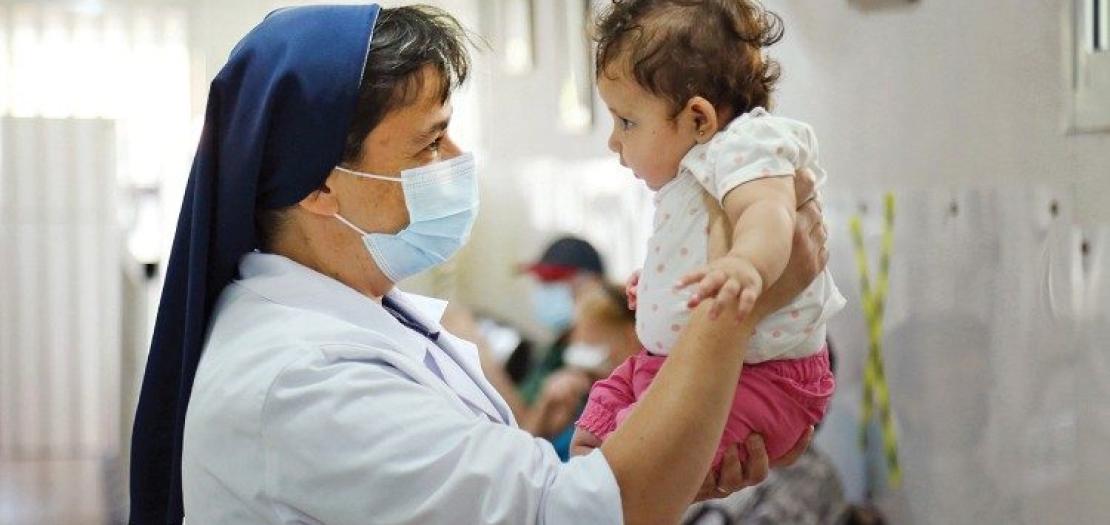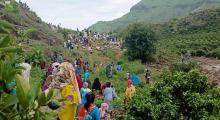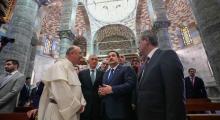Issued by the Catholic Center for Studies and Media - Jordan. Editor-in-chief Fr. Rif'at Bader - موقع أبونا abouna.org

Good Shepherd Sister Antoinette Assaf assesses a child at St. Anthony Community Health Center in Roueissat
At the entrance of St. Anthony Community Health Center, some 6 miles north of Beirut, a sticker reads, “USAID – From the American People – International Medical Corps.” It is a designation that no longer applies.
On 20 January, the U.S. administration issued an executive order freezing all government foreign assistance, initially for three months, through several departments and the U.S. Agency for International Development (USAID). The order was accompanied by a statement indicating the “foreign aid industry and bureaucracy are not aligned with American interests and in many cases antithetical to American values.”
The sudden freeze in U.S. government funding, vital for thousands of humanitarian projects — U.S. foreign assistance in 2024 totaled $56 billion worldwide — reverberated across the globe and stunned nonprofit agencies and their beneficiaries.
The decision reached St. Anthony Community Health Center quickly. Run by the Sisters of the Good Shepherd, the center received a stop-work order from International Medical Corps, which had been directing U.S. government funding to the health center since 2008.
Iraqis affected “will be pushed to emigrate, which is a big problem for the Christian community.”
“On a Sunday night, they sent us a message telling us that from Monday onward, they would stop covering the consultations, the blood tests, the medicines, the medical equipment and the medical imaging,” said Dr. Joelle Khalife, the dispensary’s medical director.
Initially, International Medical Corps only paused the funding, which represented a third of the health center’s annual budget.
“Two weeks later, the team explained to us, in a very courteous way, that our contract with them was terminated,” she said.
The consequences for the health center, which cares for 2,000 people monthly, were immediate.
“When we started charging our patients for what International Medical Corps used to cover, some of them stopped coming,” said Dr. Khalife. “Our patients come to us because they don’t have the financial means to access health care in private hospitals.”
“It was hard to explain to our patients how a decision taken in the United States leads to their health care expenses not being covered anymore,” she said. “But the Lord is with us. We will not close because of this funding problem.”
Good Shepherd Sister Antoinette Assaf, who manages international partnerships in Lebanon for her community, said these cuts have made an already difficult situation more challenging. Access to funding has become “increasingly hard” since the COVID-19 pandemic, she explained, and donor requirements have increased across the board as funding has decreased.
In mid-March, U.S. Secretary of State Marco Rubio announced 83 percent of USAID contracts were canceled and those remaining were integrated into the State Department, which had absorbed USAID in February. A month later, a final list of terminated grants had not yet been made public.
However, Geneva Solutions, an online news site that covers the work of international aid organizations, reported on 4 April that a leaked document indicated 77 percent of USAID grants — or “6,239 awards, worth $36bn in aid” — were terminated.
On the list, the World Health Organization, United Nations Development Program, Mercy Corps and UNICEF were slated to lose from one-third to 98 percent of their U.S. government funding. U.N. Women and U.N.-Habitat were slated to lose all U.S. government funding.
The administration reconsidered a few cuts and, on 9 April, restored funding to World Food Program projects in Lebanon, Syria, Iraq, Jordan, Ecuador and Somalia and at least four awards to the International Organization for Migration.
Christian organizations also were impacted: Caritas, the humanitarian and development organization of the Catholic Church, was slated to lose 25 percent of its U.S. government funding; World Vision, 16 per cent.
“These budget cuts in development aid and international cooperation are detrimental to human development, especially affecting programs supporting refugees and other vulnerable groups,” said Karim el-Mufti, professor of political science, international affairs and international law at the Jesuit-run St. Joseph University of Beirut.
This change in U.S. policy sheds light on the weight of U.S. assistance globally and throughout the Middle East, he said.
“Lebanon holds the prize of dependency on foreign aid, which is the price of having a collapsed state,” said Mr. Mufti. “The Lebanese struggle to access basic services. Programs that were supported by the United States were very useful in terms of access to health care, education and basic amenities.”
In 2024, the country plunged from a war limited to the South and the Beqaa valley into an all-out war between Hezbollah – a powerful Lebanese political party and a Shiite militia – and Israel, lasting two months. That year, Lebanon had received nearly $390 million in U.S. assistance, 63 percent for economic development and the rest for aid to support the nation’s underfunded military. The U.S. also funded 20 percent of all U.N. projects in the country.







